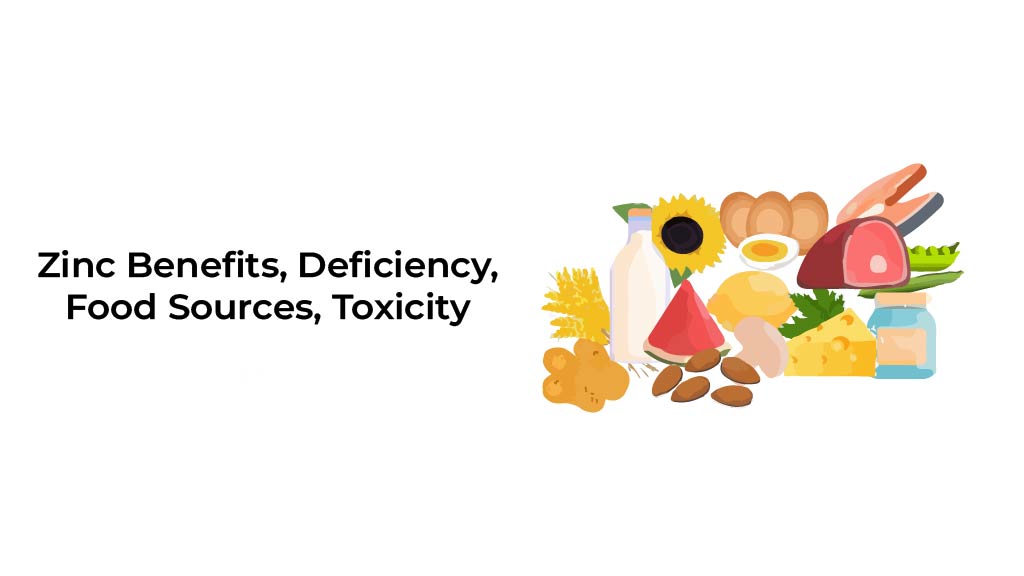
Zinc is a nutrient that play many vital roles in body. Body doesn’t produce zinc naturally, you must obtain it from foods or supplements. It is an essential nutrient. Zinc is naturally found in both plant and animal foods.
During pregnancy and lactation, zinc is needed in higher amount for newborn proper growth and development and infants up to 6 months obtain zinc from breast milk.
Zinc is required for numerous processes of body:
- Gene Expression
- Enzymatic Reactions
- Immune Function
- Protein Synthesis
- DNA Synthesis
- Wound Healing
- Growth and Development
Recommended Daily Intake:
An adequate intake of zinc is important for children for their growth and development.
Age |
Male |
Female |
|
0-6 months |
2mg | 2mg |
| 7-12 months | 3mg |
3mg |
|
1-3 years |
3mg | 3mg |
| 4-8 years | 5mg |
5mg |
| 9-13 years | 8mg |
8mg |
|
14-18 years |
11mg |
9mg |
| 19 years and over | 11mg |
8mg |
Role in Body:
Zinc is a vital nutrient that body uses in countless ways. Zinc is 2nd most abundant trace mineral in body after iron and it present in every cell. Zinc is necessary for activity of over 300 enzymes that aids in metabolism, digestion, nerve function and many other processes. In addition, it is critical for development and function of immune cells. Zinc is also fundamental to skin health, DNA synthesis and protein production. Body relies on zinc for cells growth and cell division. It is also needed for senses like taste and smell. Because 1 enzyme rely on this nutrient, for proper smell and taste. Zinc deficiency can reduce your ability of taste and smell.Health Benefits:
Researchers show that zinc have numerous health benefits:- Boost Immune System
- Accelerates Wound Healing
- May Reduce risk of some diseases
- May help treat acne
- Decreases Inflammation
- Age related Macular Degeneration
- Sexual Health
- Osteoporosis
- Neurological Symptoms
- Common Cold
- Learning and Memory
Food Sources:
Foods highest in zinc;- Shellfish: Oysters, crab, mussels, lobster and clams
- Meat: Beef, pork, lamb and bison
- Poultry: Turkey and chicken
- Fish: Flounder, salmon, sardines and sole
- Legumes: Chickpeas, lentils, black beans, kidney beans etc.
- Nuts and Seeds: Pumpkin seeds, cashew, hemp seeds etc.
- Dairy Products: Milk, yogurt and cheese
- Eggs
- Whole Grains: Oats, quinoa, brown rice etc.
- Certain Vegetables: Mushrooms, kale, peas, asparagus and beet green
- Dark Chocolate
Deficiency:
A zinc deficiency cause many health problems including;- Delayed growth in children
- A loss of appetite
- Changes in taste
- Higher risk of infections
- Fertility problems
- Diarrhea
- Problems with wound healing
- Eyes and skin lesions
- Problem in thinking
- Malabsorption
- Chronic Illness
Toxicity:
Toxicity symptoms include;- Nausea
- Vomiting
- Diarrhea
- Abdominal cramps
- Headache
- Reduce immune function
- Decreased good HDL cholesterol level
- Poor appetite
Interactions:
Possible interactions include;- Antibiotics: Using oral zinc while taking tetracycline antibiotics can interfere their ability to fight against bacteria. Taking antibiotics before 2 hour or 4-6 hours of after taking zinc to minimize effects.
- Penicillamine: Using oral zinc while taking rheumatoid arthritis drug penicillamine can reduce the drug ability to ease arthritis symptoms. Taking zinc at least 2 hour before or after taking the drug to minimize effects.
- Thiazide Diuretics: These blood pressure drugs increase the amount of zinc lost in urine.